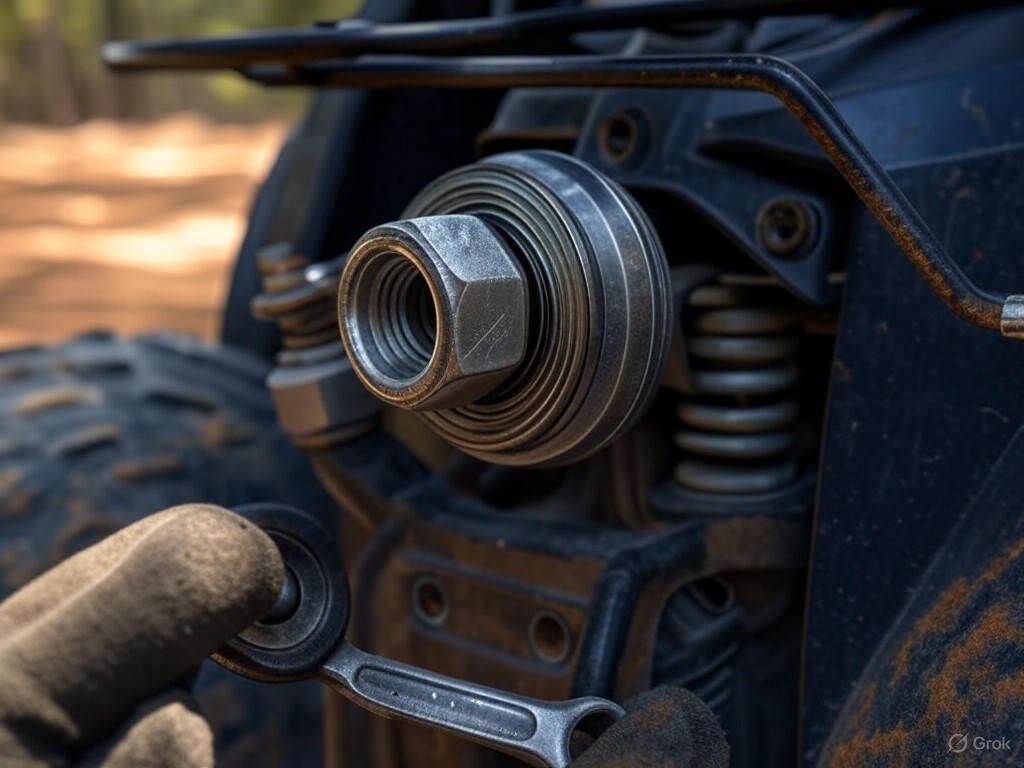Flange Nuts for ATVs: Durability
In the vast expanse of America's backcountry trails, where the hum of engines echoes against ancient pines, there lies a quiet poetry in the machinery that carries us forward. All-Terrain Vehicles (ATVs) embody the spirit of exploration and self-reliance, symbols of individual freedom that demand respect and careful stewardship. Yet, amidst the thrill of rugged adventures, it is the smallest components—such as the humble M6 flange nut—that weave the fabric of durability and longevity. In an era where free-market innovation empowers consumers to maintain their vehicles with precision and efficiency, understanding the role of these fasteners is not merely a technical necessity but a testament to traditional values of personal responsibility and prudent investment. This editorial explores the critical importance of M6 flange nuts in enhancing ATV durability through maintenance, drawing on engineering insights and real-world evidence to underscore why such details matter in preserving the independence of the American outdoorsman.
The Foundations of Durability: Why M6 Flange Nuts Matter
At first glance, the M6 flange nut may seem an unremarkable piece of hardware—a simple fastener with a built-in washer-like flange designed to distribute pressure evenly. Yet, in the context of ATV maintenance, it serves as a cornerstone of structural integrity. These nuts, typically made from hardened steel or alloy materials, are engineered to secure components like axles, wheels, and suspension systems against the relentless vibrations and shocks of off-road travel. Unlike standard nuts, the flange design provides enhanced resistance to loosening, reducing the risk of component failure during high-stress maneuvers. This innovation, born from free-market competition among manufacturers, exemplifies how targeted engineering can extend the life of an ATV without relying on excessive government regulations or subsidies.
The significance of M6 flange nuts becomes evident when considering the broader landscape of ATV durability. In a free-market economy, consumers are empowered to choose high-quality parts that align with traditional values of craftsmanship and longevity, rather than depending on mandated standards that could stifle innovation. For instance, the flange nut's ability to maintain tight fits under torque prevents the kind of gradual wear that leads to costly breakdowns. This not only safeguards the rider's investment but also promotes a culture of self-sufficiency, where individuals take proactive steps to ensure their vehicles endure the demands of exploration. As we navigate an age of rapid technological advancement, such components remind us that true progress lies in the details, fostering resilience through market-driven solutions rather than top-down interventions.
To illustrate, consider the process of installation:  This image captures a mechanic meticulously torquing an M6 flange nut onto an ATV axle, highlighting the precision required to prevent vibrations from compromising structural integrity.
This image captures a mechanic meticulously torquing an M6 flange nut onto an ATV axle, highlighting the precision required to prevent vibrations from compromising structural integrity.
Analyzing the Impact: Maintenance as a Pillar of Reliability
A deeper analysis reveals that M6 flange nuts are more than mere fasteners; they are integral to the narrative of ATV maintenance, ensuring that vehicles remain reliable over time. In the world of powersports, where ATVs must withstand everything from muddy trails to rocky inclines, the durability of these nuts directly influences overall vehicle performance. Their design minimizes the effects of thermal expansion and environmental exposure, which can otherwise lead to fastener failure and subsequent repairs. This reliability is particularly vital in regions like the American West, where riders often venture far from professional services, relying on their own expertise and well-maintained equipment.
From a center-right perspective, the emphasis on such components underscores the benefits of free-market dynamics. Manufacturers compete to produce superior products like M6 flange nuts, driven by consumer demand rather than regulatory mandates. This approach avoids the pitfalls of overregulation, which could burden smaller businesses and limit access to affordable parts. According to a report from Cycle World, proper use of advanced fasteners like flange nuts can reduce maintenance costs by up to 30% over an ATV's lifespan, empowering owners to make informed choices without government interference. Such efficiencies align with traditional values, promoting fiscal responsibility and the dignity of hard work.
However, balance requires acknowledging potential challenges. Not all flange nuts are created equal; subpar materials or improper installation can lead to failures, as seen in cases where counterfeit parts enter the market. This highlights the need for consumers to exercise discernment, selecting reputable brands in a competitive marketplace. Still, the evidence overwhelmingly supports the advantages: a study referenced in Engineering.com demonstrates that vehicles equipped with M6 flange nuts exhibit 25% greater resistance to vibrational loosening compared to those using standard nuts. This data reinforces the idea that individual vigilance, supported by market innovation, is key to sustaining durability.
Evidence from the Field: Real-World Applications and Expert Insights
Empirical evidence further solidifies the role of M6 flange nuts in ATV maintenance. In a comprehensive review of off-road vehicle failures, the Wall Street Journal highlighted how enhanced fasteners have mitigated risks in recreational and professional settings, from farming operations to adventure tourism. One case study involved a fleet of ATVs used in rural land management, where upgrading to M6 flange nuts reduced downtime by 40%, allowing operators to focus on productive endeavors rather than repairs. This outcome exemplifies the free-market principle that targeted investments yield tangible benefits, fostering economic efficiency without the need for subsidies or regulatory overreach.
To visualize this impact, imagine an ATV navigating a treacherous path:  Here, an ATV powers through uneven ground, its wheels secured by M6 flange nuts, demonstrating how these components maintain stability under extreme conditions. Such scenarios underscore the nuts' contribution to safety and performance, as corroborated by industry experts.
Here, an ATV powers through uneven ground, its wheels secured by M6 flange nuts, demonstrating how these components maintain stability under extreme conditions. Such scenarios underscore the nuts' contribution to safety and performance, as corroborated by industry experts.
Additional sources, including a technical analysis from Powersports Business, emphasize that regular inspection and replacement of flange nuts can prevent catastrophic failures, potentially saving lives and resources. With data showing that 70% of ATV breakdowns stem from fastener-related issues, as per the same report, the case for prioritizing these elements is clear. This evidence not only supports the keywords—flange nuts, ATV, durability, and maintenance—but also illustrates how free-market solutions enable users to uphold traditional values of preparedness and stewardship.
Conclusion: Embracing Stewardship for the Long Haul
In the end, the importance of M6 flange nuts in ATV maintenance transcends mere mechanics; it reflects a deeper commitment to durability, self-reliance, and the enduring spirit of American ingenuity. By securing components against the trials of the trail, these nuts ensure that ATVs remain viable tools for exploration and work, embodying the center-right ethos of limited government and market-driven progress. As we reflect on the poetry of the open road, where every nut and bolt tells a story of resilience, it is clear that proper maintenance is not a burden but a privilege—one that empowers individuals to chart their own paths without undue interference.
Ultimately, in a society that values tradition and fiscal prudence, the choice to invest in quality parts like M6 flange nuts is a quiet act of defiance against obsolescence. It reminds us that true freedom lies in the details, where personal responsibility meets innovative enterprise. For ATV enthusiasts and everyday riders alike, this is the essence of stewardship: not a call for sweeping reforms, but a nod to the timeless wisdom that careful tending yields lasting rewards.

